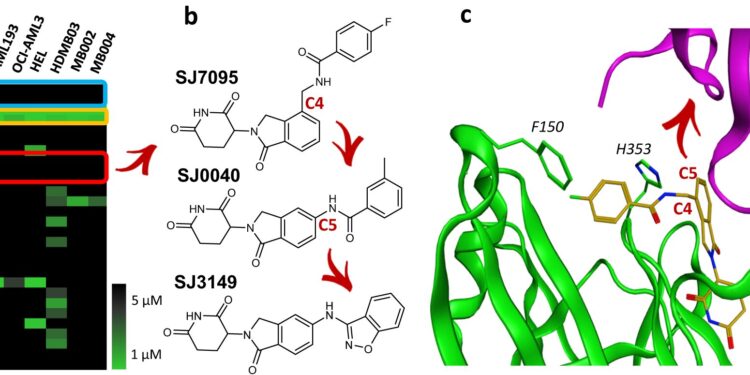Hit identification and optimization strategy. a Heatmap of selected screening results on a panel of acute leukemia (AL) and medulloblastoma (MB) cell lines (cell viability IC50 values determined by CTG tests). Blue box highlights lenalidomide and pomalidomide, yellow box highlights known GSPT degraders CC-885 and SJ6986, red box highlights MOLM-13 hits. b Optimization of the trajectory and chemical structures of the hit and leads. c SJ7095 (shown as amber rods) modeled in the lenalidomide + CRBN (green) + CK1α (purple) complex (PDB: 5FQD). The red arrow points to the substitution vector C5 which highlights the optimization strategy. Credit: Natural communications (2024). DOI: 10.1038/s41467-024-44698-1
Scientists at St. Jude Children’s Research Hospital have published their work on SJ3149, a compound with broad activity against many types of cancer, particularly acute myeloid leukemia (AML). SJ3149 adheres to cancer-related protein casein kinase 1 alpha (CK1α), leading to its destruction.
The work is published in the journal Natural communications.
“We made a molecular superglue,” said co-senior author Zoran Rankovic, Ph.D., Department of Chemical Biology and Therapeutics at St. Jude. “SJ3149 is the first potent and selective CK1α degrader in its class, demonstrating efficacy in in vitro and in vivo cancer models. »
Molecular glues work by hijacking the cell’s natural protein recycling mechanism. Molecular glue recruits the targeted protein to an enzyme that marks it for destruction through a process called proteasomal degradation. For many cancer-related proteins that cannot be adequately targeted by conventional small-molecule inhibitors, molecular glues may provide a viable therapeutic alternative. This led St. Jude scientists to develop a large, proprietary library of molecular glues and compare it to a range of cancer cell lines, finding a first result.
Once the researchers optimized the identified impact, the resulting SJ3149 molecule showed higher potency and fewer off-target effects than similar compounds. SJ3149 showed broad anticancer activity, which bodes well even for a molecular glue, hence the nickname “superglue.” The compound also appears to have a similar profile to a class of approved cancer drugs, murine double minute 2 (MDM2) inhibitors, further indicating that it may have clinical utility.
Molecular glue discovery platform
Molecular glues provide a promising source for finding new therapies because they can target previously undruggable proteins. However, finding and adapting these molecules for clinical use has been a challenge. The identification and refinement of such a molecule provides proof of concept that St. Jude’s approach can accelerate this discovery process.
“Our work provides a model for conducting similar studies on other targets,” said co-corresponding author Marcus Fischer, Ph.D., Department of Chemical Biology and Therapeutics at St. Jude. Researchers discovered the compound, modified it through rational design, and tested its effectiveness. To understand how the compound worked so well, Fischer’s group crystallized the large complex of the targeted protein and SJ3149 linked to the cellular machinery responsible for marking proteins for degradation, a protein ubiquitin ligase device.
“We could see that the beauty of this compound is that it interacts directly with CK1α,” Fischer explained. “SJ3149 directly reaches and connects CK1α to the enzyme that marks it for the cellular degradation machinery, providing a rationale for the compound’s high degradation efficiency.”
Understanding how these compounds work at the atomic level could pave the way for the rational design of molecular glues.
“This is a perfect example of taking chemical matter and structural and mechanistic analysis to understand cellular efficiency and activity,” said co-corresponding author Jeffery Klco, MD, Ph.D., Department of Pathology from St. Jude, physician-scientist. with a focus on AML. “At this point, it’s still just a lead compound, but it could become another potential option to treat different pediatric cancers, which is exciting.”
Creating the complex was a major collaborative effort. The work involved design, synthesis and screening of the molecular glue library, structure-guided medicinal chemistry optimization and testing on patient-derived cancer cells. This was only possible thanks to the combined expertise of Rankovic, Fischer and Klco laboratories, together with internal and external collaborators. The approach can now be used as a basis for new discoveries.
“Chemical biology has entered a new paradigm with molecular glues,” Rankovic said. “With this study, we have now established a pipeline to identify promising new molecular glues for cancer treatments.”
More information:
Gisele Nishiguchi et al, Selective CK1α degraders exert antiproliferative activity against a wide range of human cancer cell lines, Natural communications (2024). DOI: 10.1038/s41467-024-44698-1
Provided by St. Jude Children’s Research Hospital
Quote: Molecular ‘superglue’ shows promise of cancer drug discovery platform (January 16, 2024) retrieved January 16, 2024 from
This document is subject to copyright. Except for fair use for private study or research purposes, no part may be reproduced without written permission. The content is provided for information only.



